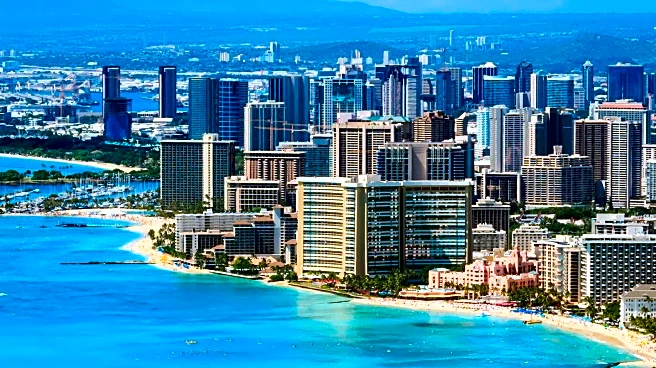What's Happening?
A traveler has shared her experience of visiting Hawaii while maintaining a sober lifestyle. After giving up alcohol nearly two years ago, she embarked on a trip to Hawaii with friends who also abstain
from drinking. The group stayed at Disney's Aulani resort on Oahu, engaging in activities such as sunrise yoga, snorkeling, and attending an open-bar luau while enjoying non-alcoholic beverages. The traveler highlighted the benefits of sober travel, noting that it allowed her to fully appreciate the beauty and culture of Hawaii without the distractions of alcohol. She expressed gratitude for the timing of her visit, which coincided with her commitment to sobriety.
Why It's Important?
The story underscores the growing trend of sober travel, which is gaining popularity among individuals seeking more meaningful and health-conscious travel experiences. By choosing to travel without alcohol, individuals can enjoy destinations more fully, engage in activities with greater clarity, and avoid the negative effects of hangovers. This approach to travel can lead to deeper cultural appreciation and personal growth. The traveler's experience in Hawaii serves as an example of how sobriety can enhance travel experiences, offering a fresh perspective on leisure and relaxation.
What's Next?
As the trend of sober travel continues to grow, more destinations and travel companies may cater to this demographic by offering alcohol-free activities and experiences. This could lead to the development of specialized travel packages and itineraries that focus on wellness and mindfulness. Additionally, the travel industry might see an increase in demand for accommodations and events that prioritize sober-friendly environments, potentially influencing how travel is marketed and experienced.
Beyond the Headlines
The rise of sober travel reflects broader societal shifts towards health-conscious living and mindfulness. It challenges traditional notions of leisure and vacationing, which often involve alcohol consumption. This movement may encourage individuals to reconsider their relationship with alcohol and explore alternative ways to enjoy travel and leisure. Furthermore, it highlights the importance of inclusivity in the travel industry, ensuring that all travelers, regardless of lifestyle choices, can have fulfilling experiences.










